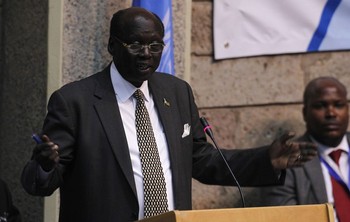South Sudan vows to go ahead with elections despite US withholding support
January 16, 2015 (JUBA) – South Sudan said on Friday it was prepared to go ahead with planned elections despite the United States and other foreign countries refusing to support the ballot.

“It is unfortunate that some countries have decided to withhold providing support for elections, which is an essential component of democracy and one of the international mechanisms to allow the citizens to choose the leaders of their choice to different level of government,” Benjamin said.
The minister said he had received a message from the US government and several other countries informing South Sudan of their decision not to support the elections scheduled to take place between May and June.
However, Benjamin said the US had indicated it would continue to provide support to the South Sudanese government in other areas, including education, health, agriculture and humanitarian issues.
“Their (the international Community) concern for withholding support for elections is that there is a security [threat]. They are talking about transitional arrangements, which you know very well the government has done so much. The president has made a lot of the compromise. He has accepted the creation of the position of the prime minister which is not there in the constitution – but because of peace, he accepted,” said Benjamin.
“The international community should have appreciated this gesture and work together with the [South Sudanese] government so that those who are not moving should move,” he added.
He said failure to go ahead with elections could result in a power vacuum and potentially lead to a “constitutional crisis” in the country.
“It is not in the interests of the people of this country to allow [a] power vacuum and illegitimacy. They should be given the opportunity to decide through elections.
“The council has already passed the budget for elections to go ahead as planned and this is where we need the international assistance so that there is a government which will work for peace,” he added.
Benjamin’s remarks came after the ambassador of United States to South Sudan informed him on Friday that his government would not be supporting elections scheduled to take place later between May and June.
US ambassador Charles Twining told reporters at a news conference in the capital, Juba, on Friday that restoring peace should be prioritised before elections are held.
“We continue to think that there was not much time to organise the election. There was no security for the organisation of the election and no personnel to finance this election,” he said.
However, Twining indicated it was ultimately up to South Sudan to decide whether to proceed with the elections despite the current situation.
“On the other hand, you are a sovereign country and you can have elections tomorrow if it is what you believe is appropriate. We do not believe it is appropriate because a peace process is underway and we want to see the peace process concluded,” he added.
The US diplomat also confirmed that he had held a meeting on Friday with Benjamin and other government officials during which he conveyed the US government’s position on the matter.
“We have a peace process that is going on now, and there were agreements even last May that elections will be held once there is a transitional government and the government can organise the election. This is what we want to see happen and if that does not happen, as things are looking, the US is not going to support the election of 30 June,” said Twining.
South Sudanese government and rebel forces have been engaged in an armed struggle for over a year since an internal dispute within the country’s ruling SPLM party turned violent.
Ongoing peace negotiations between the warring parties and successive ceasefire agreements have so far failed to yield a lasting political settlement to the crisis.
(ST)
